What are SPACs and should you invest in them?
By Beansprout • 01 Aug 2022 • 0 min read
Ever wondered what a Special Purpose Acquisition Company (SPAC) is? We explain what a SPAC is and provide resources for you to find out more!

In this article
TL;DR
- A SPAC is a “blank-check company” which has raised money to acquire another company.
- SPACs have grown in popularity in recent years and are now seen to be more serious investment vehicles.
- Compared to traditional IPOs, SPACs offer some degree of investor protection.
- Investors should have a good understanding of the managers behind the SPAC before deciding to invest in them.
What is a SPAC?
A SPAC is formed when a group of financial managers come together to raise money through an initial public offering (IPO). Proceeds from the IPO are deposited into a third-party account (escrow). Sponsors then start looking for target companies to acquire.
If an acquisition is made, the SPAC and the target company combine to form a new publicly traded company. If an acquisition is not made, the SPAC is dissolved and investors get their money back.
Sounds straightforward? This is essentially the process of how a SPAC works. In essence, a SPAC is a listed investment vehicle with no prior operating history. It is formed to raise money for the sole purpose of acquiring an operating business or asset.
Some examples of companies which have been combined with SPACs include:
- Grab Holdings Limited (GRAB)
- Lucid Motors (LCID)
- QuantumScape (QS)
- SOFI Technologies Inc. (SOFI)
- DraftKings (DKNG)
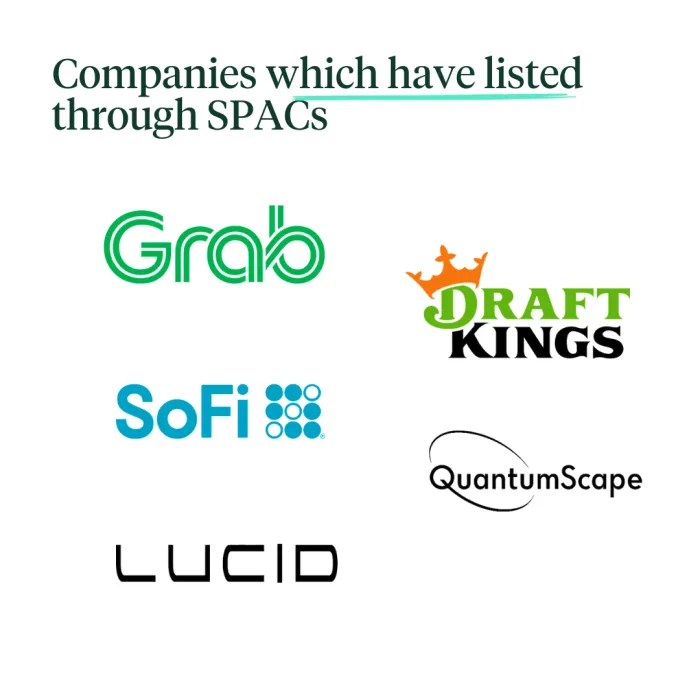
Why should I care about SPACs?
SPACs offer an alternative to traditional IPOs in several ways. Firstly, they offer certain investor protections. Secondly, they offer a simpler process for companies to go public. Thirdly, they offer targets’ shareholders greater certainty on stock valuation.
In terms of investor protection, these are the key safeguards for SPACs listed on the Singapore exchange (SGX):
- Redemption rights for independent shareholders: This means that you can choose to redeem your shares for cash in the escrow account prior to completion of the business acquisition, regardless of your vote
- Voting rights for independent shareholders: The business acquisition can only proceed if more than 50% of independent directors approve the transaction and more than 50% of shareholders vote in favour of the transaction
SPAC listings have become increasingly common in recent years. At its previous peak in 2007, there were 66 SPAC IPOs in the US. But in 2020, the number of SPACs that went public rose to 248. This increased further in 2021, with a whopping 613 SPAC IPOs in the US stock market.
One reason for this is that SPACs have become more serious investment vehicles due to the presence of more well-known participants. The sizes of SPACs have also generally increased. Moreover, more SPACs have been able to acquire targets successfully, leading to increased investor confidence.
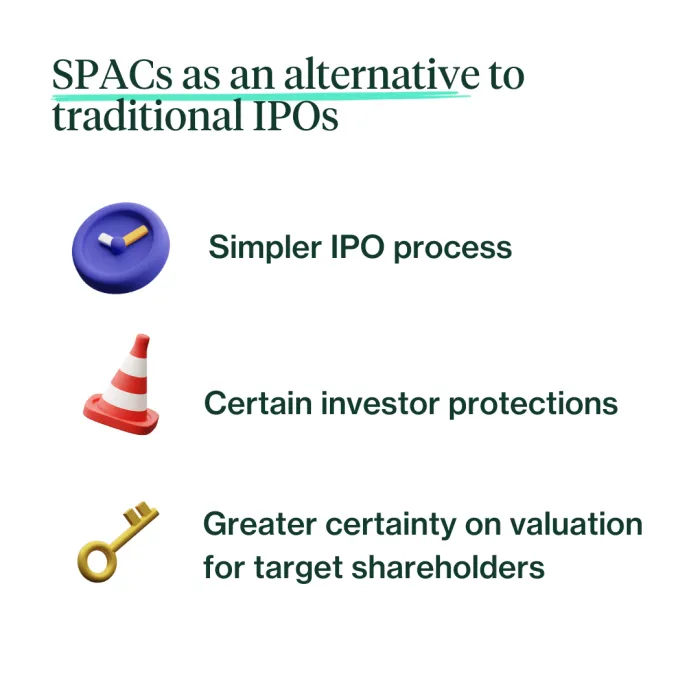
What should I think about before deciding to invest in a SPAC?
One noteworthy feature of SPACs is that investing at different parts of the life-cycle and in different products (units, common stock, or warrants) expose the investor to different degrees of potential upside and risks. As a new product type, investors should make sure they are aware of the product structure and risk-reward associated with investing in SPACs.
These are a few things to consider before deciding to invest in a SPAC:
- Sponsor track record: As a blank check company with no operating history and assets, the quality of the sponsors could determine the prospects of the SPAC. This is quite similar to the importance of REIT managers in determining whether the REIT is well-run and is able to find quality acquisitions. Investors should examine whether the management team have domain knowledge and are well connected in the segment they are looking to acquire from, whether they have experience in mergers and acquisitions, and have sufficient ‘skin-in-the-game’
- Acquisition target: Following the announcement of the business combination, investors should examine the target company just like they would evaluate any other stock they are looking to buy. Some of the factors to look at include the company background, industry outlook, management team, financial status, as well as valuation.
- Investment objectives and risk appetite. Investors should also think about how having SPACs in their portfolios would align with their investment objectives and risk appetite. Are you aware of the potential dilution risk and liquidation risk?
In summary, SPACs provide investors with an opportunity to invest in private equity arrangements (eg high growth companies) in the form of a publicly listed company. While there is some degree of investor protection such as through the redemption feature, investors should be aware of the risks associated with the product type. In thinking about whether to invest in a SPAC, investors should find an investment strategy best suited for their investment objectives, risk appetite and time horizon. More importantly, always think about the potential risk-reward and do not buy on speculation. 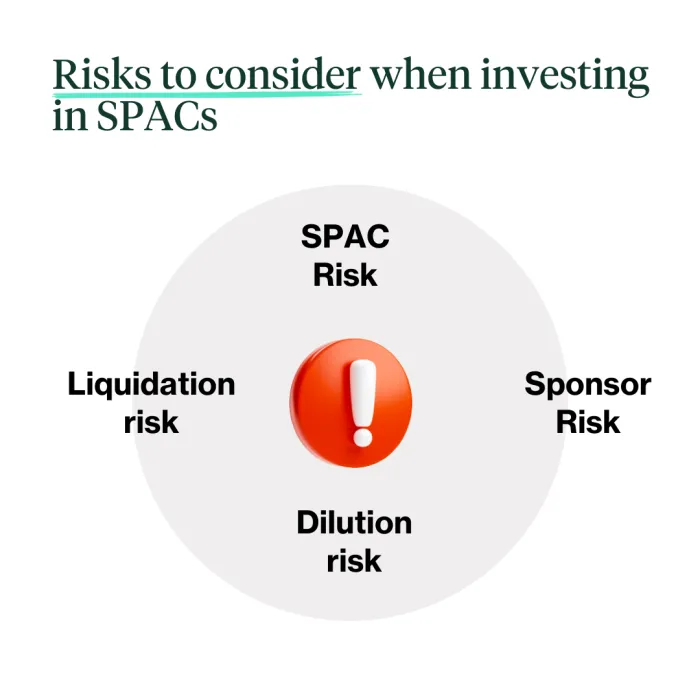
What do I have to do at detachment and what are warrants?
If you are an investor in a SPAC, you would probably have heard about SPAC detachment. This is when the SPAC unit separates into individually traded SPAC shares and warrants. This happens typically on the 45th calendar day from the listing date of the SPAC unit.
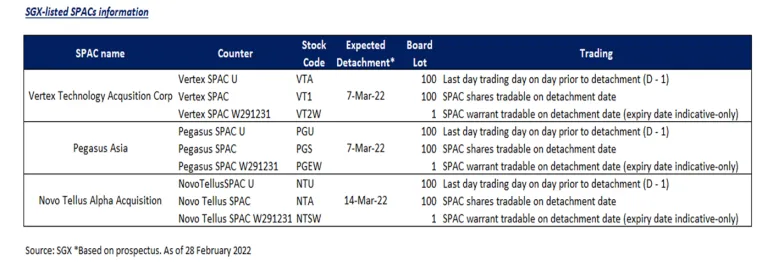
#1 Check that you have whole warrants
The three SPACs currently listed on SGX (as at 28 February 2022) will automatically detach on detachment date (D) into shares and warrants. As such, investors do not have to do anything to receive the SPAC shares and warrants.
As fractional warrants that cannot be combined into whole warrants will be disregarded after detachment, you will need to make sure you hold enough SPAC units that upon detachment, whole warrants will be issued!
Unitholders’ accounts will be credited with SPAC shares and warrants two business days after the detachment date (D + 2).
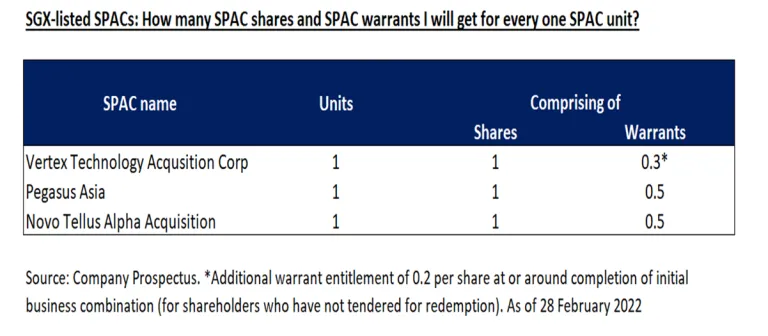
#2 Understand what are SPAC warrants
The SPAC warrant gives you the right to purchase additional shares in the company at a specific price in the future.
It is a feature for SPACs with the intention of enhancing the potential return to investors for agreeing to have their capital held in the trust account until the SPAC completes a business combination.
SPAC warrants are generally more risky compared to the shares as SPAC warrants do not have voting, redemption or liquidation rights. They will also expire upon a liquidation of a SPAC and/or if a SPAC fails to complete its initial business combination within the stipulated timeline.
| Common shares | Warrants | |
| Redemption feature | Can be redeemed for cash prior to completion of business combination. | No redemption feature |
| Voting rights | Voting rights on business combination | No voting rights unless exercised |
| Dilution | Investors may be diluted by shares issued as part of: Sponsor’s promote PIPE investorsExercising of warrants | Exercising of warrants will dilute your shareholding in the SPAC common stock |
| Leverage | Less leveraged | More leveraged |
#3 Decide on investment strategy around SPAC shares and warrants
Thereafter, you can choose an investment strategy around the SPAC shares and warrants that might be most suited for you.
For example, selling the shares for close to its NAV, while keeping the warrant might give you an option to buy potentially valuable shares of a future public company.
On the other hand, selling the warrants while keeping the share might allow you to reduce your effective entry price of the share, while limiting risks given the redemption feature of the SPAC share.
This article was first published on 01 August 2022 .
Gain financial insights in minutes
Subscribe to our free weekly newsletter for more insights to grow your wealth